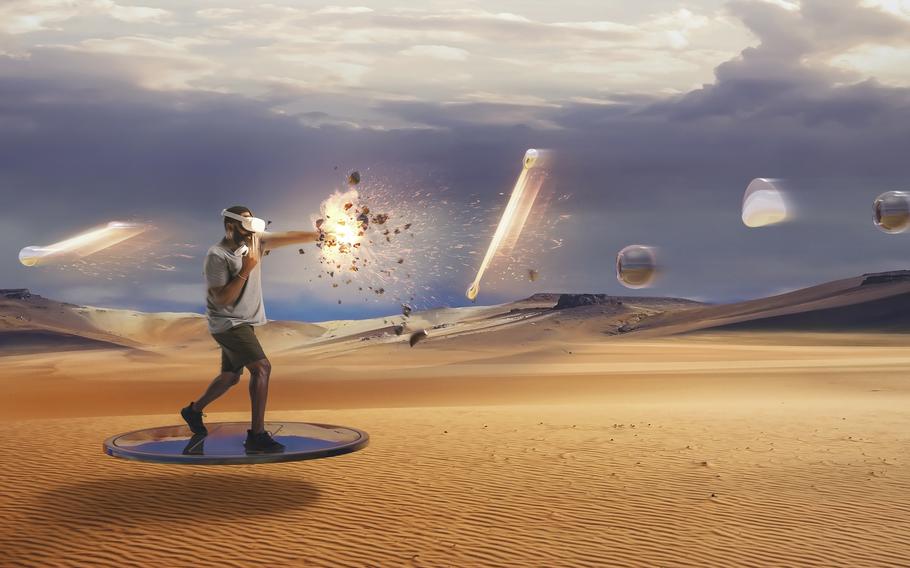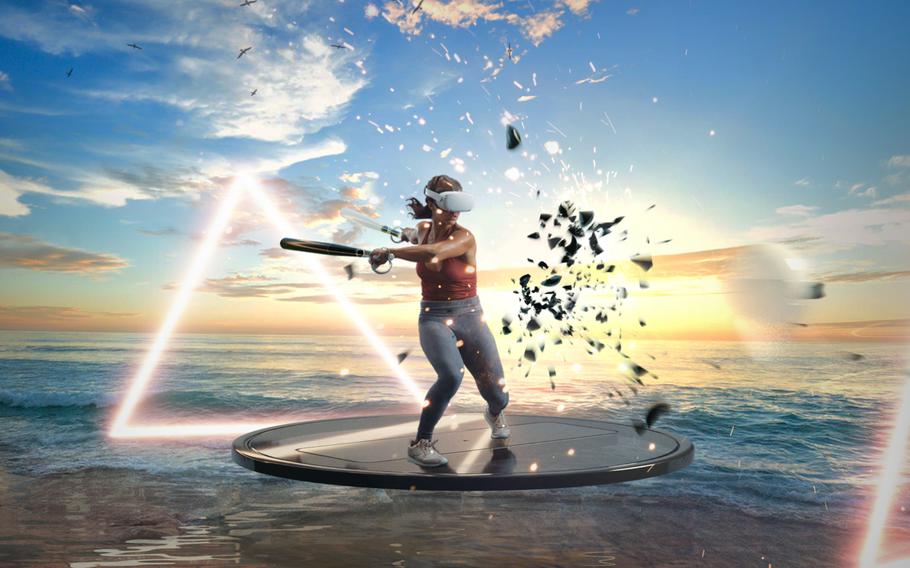
Supernatural is essentially a rhythm game that prompts users to swat or punch floating orbs hurled at them with recognizable music hits in the background. (Supernatural)
I detest fitness classes. It is a deep-rooted loathing, and it has always driven me to find literally any alternative to queuing up in front of an obnoxiously spunky trainer with obnoxiously flawless abs as they bark encouragement that my brain mutates into verbal versions of the jabs they're instructing me to throw.
Fitness instruction unsettles me in ways I can't fully describe. I feel uncomfortable. I feel judged. And I feel out of shape, which I know is the reason I'm there in the first place. So, I stop, my fitness declines even more and I feel worse about myself. This cycle has repeated itself a bit during the pandemic since my usual regimen of rec sports has been put on hold.
It's a bit of a Catch-22, but it's also one that Supernatural, a virtual reality fitness app released in 2020, has helped me break through the way it approaches workout routines. Instead of trying to surpass goals like running faster miles or throwing more weight on the bench press, it focuses on the thing that's vexed me most around working out: finding the motivation to simply show up and do it.
The app essentially functions as a rhythm game in which the primary modes prompt users to swat or punch floating orbs hurled at them from a portal. The exercise is paired with music that you will actually recognize - Billie Eilish, Bob Marley, Dua Lipa, the Jackson 5 - which is a rarity given the associated music licensing fees. The workouts also take advantage of one of virtual reality's best traits, zooming users to normally unreachable locations like the caldera of a volcano, the surface of the moon, the top of China's Great Wall or the steps of pyramids in Egypt, providing a gorgeous, 360-degree environment far more scenic than your local Orangetheory gym.
Then there are the trainers who issue instructions with their joyful expressions (instead of the canned lines found in most other fitness apps) and coax me on. Normally I find such motivational chatter inauthentic and irksome, but somehow in "Supernatural," I like it.
What sets Supernatural apart from other fitness classes and apps, to me, is how it is calibrated. Its goal isn't to work users into sweat puddles. It isn't trying to turn users into Olympians, beauty pageant contestants or other paragons of fitness and fabulous physiques. There's no focus on dropping pounds. The goal is to achieve an incrementally fitter version of you. So all of that encouragement hits me differently than some boot camp commandant. It feels attainable - and, more importantly, it keeps me coming back.
While the workout is gamified, tracking streaks for hitting targets and awarding points for power and accuracy, the comments from the trainers are focused on making the user feel comfortable. Sure, they'll encourage people to push themselves as workouts draw to a close, to engage their core and feel the burn during squats, but the most valuable comments are the ones that address the hardest part of any workout routine: simply showing up.
What Supernatural's trainers - like Head of Fitness Leanne Pedante, or my favorite coach, Raneir Pollard - do best is when they make you feel comfortable. When they appear "in person" at the start of your routine and continue their off-screen encouragement during the session, they praise you for putting in the work, but even more so for just logging on. There's a Stuart Smalley component to the workouts. They don't make you feel like a pitiable schlub who overindexes on Buffalo wings and IPAs, out of place in a gym full of well-toned regulars. They make you feel like a normal person with real, relatable challenges and mental barriers to overcome. Pretty much every workout includes at least one line praising users for putting in the work because they, the user, are worth it.

Supernatural takes advantage of virtual reality’s flexibility in its many exotic physical settings, such as the surface of the moon or the pyramids of Egypt. (Supernatural)
As a former varsity athlete that played amateur baseball after college and the beer-league softball and dek hockey, I like the idea of working out in a competitive environment. Jogging by myself never appealed to me; I'd usually stop after a mile or two because I was bored and more focused on my discomfort than anything else. But I would sprint up and down a floor hockey rink until I was a panting mess because I wanted to win and didn't want to let my teammates down. I burned way more calories and stayed in far better shape playing dek hockey, racking up more miles than I'd ever log jogging on my own. A combination of competition and accountability provided me with the right motivation to invest my time in my fitness.
I find something similar with Supernatural. The tracked stats prompt you to perform better than last time, with increasing skill levels (from low- to high-impact) to provide a way to measure your growth. It feels different from FitXR, another VR workout app I've played that features a prominent scoreboard and streak counter that frustratingly resets when you miss a target (or, more frustratingly, when the app fails to register your punch). Whenever I'd see it plummet from the 500s back to zero, it was super depressing because it usually meant I wouldn't be able to beat the lobby leader since they typically miss, at most, one target per session. It felt like I'd somehow lost at working out, even though I know that's ridiculous in the grand scheme of things.
Supernatural focuses more on that bigger picture: the importance of investing in yourself, your health and well-being. That being said, its scoring system is ... questionable. I'll miss targets or hit them with the wrong hand only to find my streaks were still intact or that I had achieved upward of 90% accuracy for my workout (when I definitely did not). But even the scoring boosts and inflation play into the prioritization of inspiring the user to keep coming back. The ability to select your own tempos and sort workouts by music playlist and trainers help make Supernatural accessible as well. To wit, my 70-year-old mother has adopted the workout app in her daily routine, even involving herself in its super-wholesome online community.
Maybe I'm a sucker, but the encouragement works more effectively for me than other motivational approaches, such as the competitive environment of FitXR where you're measured against other live users in the lobby. Cynically, you could say such lines play directly into the financial model for Supernatural, with its subscription service priced at $18.99 a month or $179.99 per year. That's almost double the subscription to FitXR ($9.99 per month), but to me, the differences justify the extra cost, and it's still far cheaper than Orangetheory's unlimited classes package ($59 per month).
There is no filter or guise to Supernatural's message: Your fitness is important because you are important. And the "Supernatural" trainers do a far better job inspiring that sentiment than Captain Kettlebell at that old garage-turned-CrossFit-studio down the street.
In addition to my neuroses about traditional fitness classes, another deterrent to my workouts is time and practicality. With two kids and a more-than-40-hour-a-week job, schlepping to a gym before work seems like a penal sentence and trying to squeeze in a workout session after work - when, in normal times, I have to commute, cook dinner, do the dishes, bathe the kids and put them to bed before I had any hint of free time - felt exhausting. With VR and more time working at home during the pandemic, I can slip on my Oculus glasses and fit in a 30-minute workout over lunch or whenever I have a gap in my schedule. Even if it's after bedtime for the kiddos, I don't have to get dressed and head out to the gym - I just pop downstairs.
The drawbacks for Supernatural are surprisingly few. Beyond the relative expense of the subscriptions, the biggest is the space required, which can be a challenge for those living in close quarters. Depending on your height, you'll need a circular space between 5-7 feet in diameter, with enough space overhead to allow you to fully extend your arms. This is a limitation of most good VR games and apps, however. The main mode for Supernatural, in which you swat a pair of batons at the orbs a la Beat Saber, requires a bit of space, but the recently incorporated boxing mode makes this less of an issue (and takes a low ceiling out of play).
It would also be wonderful if a future update could incorporate hand-tracking. Occasionally, I'd inadvertently press a button on the handsets that paused the workout or popped me back to the Oculus menu. Given the intensity of some of the workouts (you will sweat, and for the high-temp workouts, you will sweat a lot) it's a little too easy to press the wrong button.
It also must be noted that Meta (nee Facebook) acquired the studio that developed Supernatural in 2021. Fitness plays a role in Mark Zuckerberg's vision for the metaverse, which could prompt additional investment into the app. On the flip side, the company's handling of personal information may give potential users pause when it comes to their biometric data.
In addition to the workouts, there is a meditation mode and also a "moment" mode, in which you just spend time alone looking around your virtual environment (though you can't move around in it). I've gotten less use out of these, but the guided meditation revolves around some of the same themes espoused by the trainers: You're worth investing in, and you should delight in the journey of self-improvement. With Supernatural, I have.
Platforms: Oculus Quest and Quest 2
Online: getsupernatural.com